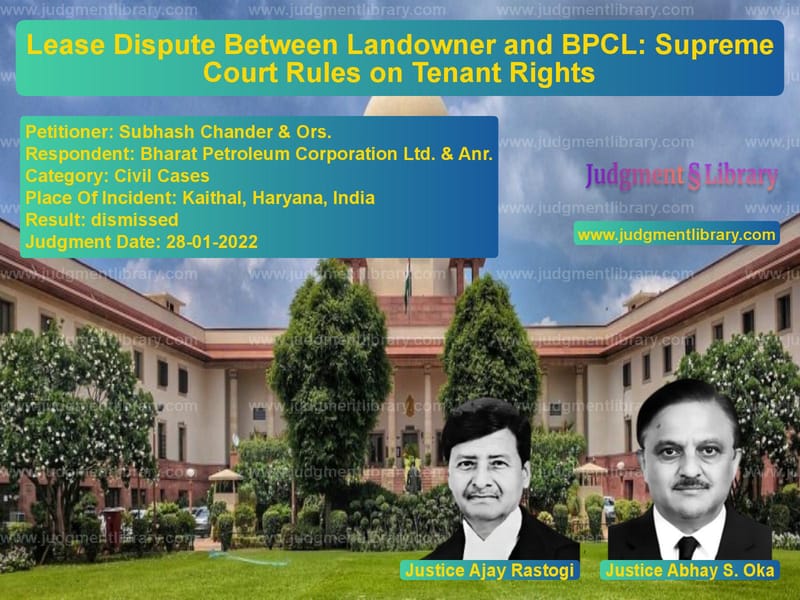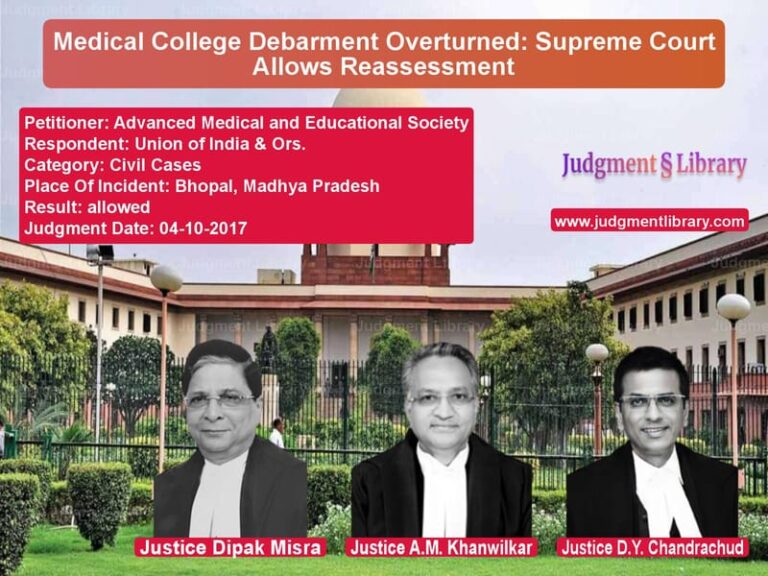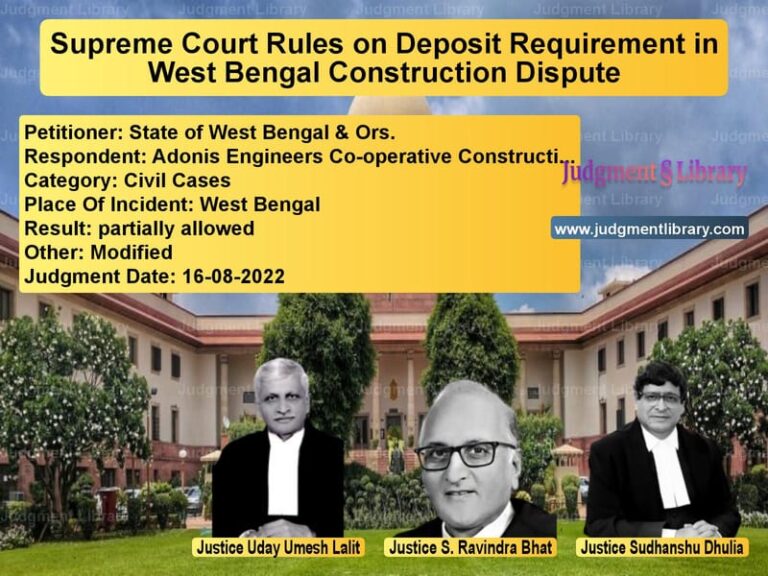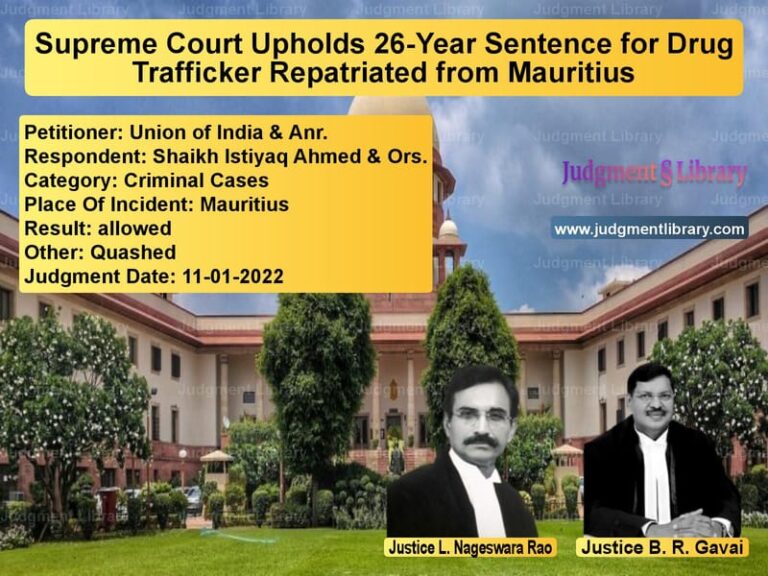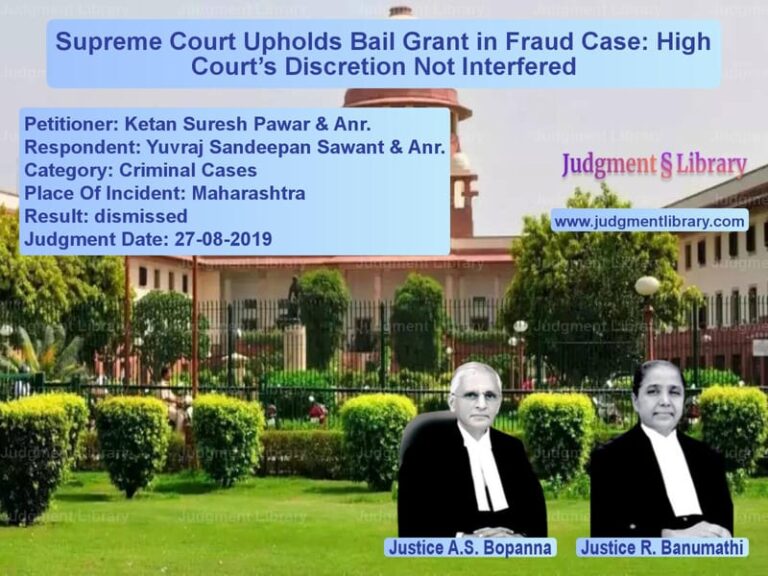Lease Dispute Between Landowner and BPCL: Supreme Court Rules on Tenant Rights
The case of Subhash Chander & Ors. v. Bharat Petroleum Corporation Ltd. (BPCL) & Anr. involved a dispute over the possession of leased land after the expiration of the lease agreement. The Supreme Court was tasked with determining whether the civil court had jurisdiction to hear the matter or whether eviction proceedings should have been pursued under the Haryana (Control of Rent & Eviction) Act, 1973 (Act 1973).
Background of the Case
The appellants were the legal heirs of Vinod Kumar, the original owner of a plot measuring 10,000 square feet in Kaithal, Haryana. The land was leased out to M/s Burmah Shell Oil Storage Distributing Company Ltd. in 1958 for 20 years at ₹35 per month. The lease agreement included a renewal clause allowing for an extension of another 20 years, which was exercised, extending the lease until April 1, 1998.
In 1976, the Burmah Shell (Acquisition of Undertakings) Act was enacted, transferring the rights of Burmah Shell to BPCL. After the lease expired, the appellants served BPCL with a legal notice to vacate the property. BPCL, however, refused to vacate, arguing that they had become statutory tenants under the Act 1973 and could only be evicted under its provisions.
Arguments of the Petitioners (Subhash Chander & Ors.)
- The lease agreement expired on April 1, 1998, and BPCL’s continued possession was unauthorized.
- The Act 1973 did not apply since the property was governed by the Burmah Shell (Acquisition of Undertakings) Act, 1976.
- The appellants required the land for their bona fide personal use and had the right to reclaim possession.
- BPCL had sub-let the property without permission, violating the terms of the original lease.
- The appellants were entitled to compensation (mesne profits) for BPCL’s unauthorized use of the land.
Arguments of the Respondents (BPCL & Anr.)
- The property fell under the Act 1973, making BPCL a statutory tenant after the lease expired.
- Under Section 5(2) of the Burmah Shell (Acquisition of Undertakings) Act, 1976, the leasehold rights were transferred to BPCL, and the government had permitted their continued occupation.
- Since the property was within the municipal limits of Kaithal, any eviction had to follow the procedures outlined in the Act 1973.
- The appellants had previously filed an eviction suit before the Rent Controller, which was dismissed in 1986.
Key Observations of the Supreme Court
1. Application of the Rent Control Act
The Court ruled that BPCL was a statutory tenant under the Act 1973 and could only be evicted under its provisions:
“Even after the expiry of the lease term, the respondents became statutory tenants. The jurisdiction of the Civil Court is impliedly barred, and eviction could only be sought under the Act 1973.”
2. Override of the Rent Control Act by the Burmah Shell Act
The appellants argued that the Burmah Shell (Acquisition of Undertakings) Act, 1976 overrode the Act 1973. However, the Supreme Court rejected this claim, stating:
“The Burmah Shell Act only facilitated the transfer of leasehold rights to BPCL. It did not exempt the property from the provisions of the Act 1973.”
3. Previous Dismissal of Eviction Proceedings
The Court noted that the appellants had earlier sought eviction under the Rent Control Act, but their plea was dismissed in 1986. The Court held that:
“Once the eviction petition under the Act 1973 was dismissed, the appellants could not bypass it by filing a civil suit for possession.”
4. Civil Court’s Lack of Jurisdiction
The Court ruled that the Civil Court had no jurisdiction to entertain the suit:
“When a special law provides a remedy, a general remedy under the Civil Court cannot be sought. The appellants must initiate eviction proceedings before the Rent Controller.”
5. No Unauthorized Subletting
The appellants claimed that BPCL had sublet the property without consent. However, the Court found no evidence of unauthorized subletting:
“There is no material to prove that BPCL had sublet the premises. The allegation of subletting is unfounded.”
Final Judgment
The Supreme Court dismissed the appeal, affirming that BPCL was a statutory tenant and could not be evicted through a civil suit. The key takeaways from the judgment are:
- The Civil Court lacked jurisdiction over the matter.
- BPCL was a statutory tenant under the Act 1973 and could only be evicted through rent control proceedings.
- The Burmah Shell (Acquisition of Undertakings) Act, 1976 did not exempt BPCL from rent control laws.
- Since the appellants had earlier filed an eviction suit and lost, they could not re-litigate the same issue in a civil suit.
- The claim of unauthorized subletting was unsubstantiated.
This ruling reinforces that tenancy disputes must be resolved under the appropriate rent control legislation, preventing landlords from bypassing statutory protections for tenants.
Petitioner Name: Subhash Chander & Ors..Respondent Name: Bharat Petroleum Corporation Ltd. & Anr..Judgment By: Justice Ajay Rastogi, Justice Abhay S. Oka.Place Of Incident: Kaithal, Haryana, India.Judgment Date: 28-01-2022.
Don’t miss out on the full details! Download the complete judgment in PDF format below and gain valuable insights instantly!
Download Judgment: subhash-chander-&-or-vs-bharat-petroleum-cor-supreme-court-of-india-judgment-dated-28-01-2022.pdf
Directly Download Judgment: Directly download this Judgment
See all petitions in Property Disputes
See all petitions in Landlord-Tenant Disputes
See all petitions in Contract Disputes
See all petitions in Specific Performance
See all petitions in Judgment by Ajay Rastogi
See all petitions in Judgment by Abhay S. Oka
See all petitions in dismissed
See all petitions in supreme court of India judgments January 2022
See all petitions in 2022 judgments
See all posts in Civil Cases Category
See all allowed petitions in Civil Cases Category
See all Dismissed petitions in Civil Cases Category
See all partially allowed petitions in Civil Cases Category

